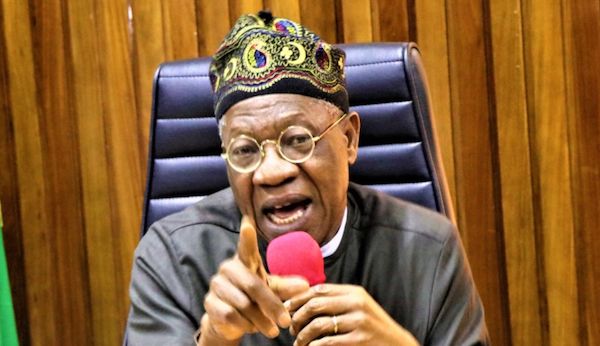News
Media Group accuses Nigerian govt of ploy to regulate social media

In the aftermath of guidelines directed at digital platforms in the country by the Federal Government, the Media Rights Agenda (MRA) on Tuesday, called on the Federal Government to discontinue its attempt to adopt a “Code of Practice for Interactive Computer Service Platforms/Internet Intermediaries.”
This was contained in a press release issued by Idowu Adewale, MRA Communications Officer.
MRA Programme Director, Mr Ayode Longe, accused the FG of trying to regulate social media and other online platforms through the backdoor by circumventing the legislative process.
The FG on Monday issued new regulations for Facebook, Twitter, and other social media platforms in Nigeria.
The spokesperson for the National Information Technology Development Agency (NITDA), Hadiza Umar, who announced the new guidelines in a statement in Abuja, said they were designed to protect Nigerians and foreigners living in the country as well as define guidelines for interaction on the digital platforms.
Under the new regulations, the platforms are expected to register with the Corporate Affairs Commission (CAC) and appoint a designated country representative to interface with Nigerian authorities.
They are also to comply with all regulatory demands and all applicable tax obligations on its operations under Nigerian law.
The development came more than one year after the federal government suspended Twitter operations in Nigeria over alleged use of the microblogging platform for unacceptable activities.
However, the MRA described the draft Code of Practice developed by the National Information Technology Development Agency (NITDA) and published for public comments as a clumsy attempt to usurp the powers, functions and authority of the National Assembly as well as a breach of the constitutional rights of Nigerians.
Condemning the effort, the MRA’s Programme Director said: “The Federal Government is clearly attempting to circumvent the legislative process in favour of a backdoor approach to regulate social media and other internet platforms. It is curious that the Government has chosen to use an administrative document to surreptitiously create criminal offences as the document states unequivocally that any platform or internet intermediary responsible for violating its provisions will be liable to prosecution and conviction.”
He argued that NITDA’s use of the term “Code of Practice” to describe the document amounts to acting under false pretenses to deceive Nigerians into believing that the government is seeking to protect them when the government’s true intention is to control social media and other Internet platforms by requiring them to register with the government and thus muzzle the right to free expression online.
Read also:Nigerian govt doesn’t play politics with security, welfare of its citizens, Lai Mohammed claims
Mr. Longe contended that the document is a breach of Articles 19 of the Universal Declaration of Human Rights (UDHR) and Nigeria’s treaty obligations under the International Covenant on Civil and Political Rights (ICCPR), which gives everyone the right to freedom of expression, including the “freedom to seek, receive and impart information and ideas of all kinds, regardless of frontiers…”
According to him, “the name is problematic. Although it is termed a code of practice, it is in fact not intended to provide guidance for the implementation of any specific law or regulation. Rather, it creates criminal offences which are not contained in any existing Law and attempts to legitimize them by a vague reference to its enabling Act and other laws, which is beyond the remit of any such administrative document.”
Mr. Longe argued that the underlying rationale for many of the provisions of the document are unrealistic and unreasonable as they defy logic and common sense.
He said: “In today’s globalized world, is it possible or realistic to expect global Internet platforms like Facebook, Twitter and others to register with the government of every country in the world where they have users and set up offices in all those countries, which is the implication of the Federal Government’s demand?
“Conversely, Nigeria’s external broadcaster, the Voice of Nigeria, broadcasts its signal and content to dozens of countries around the world and runs a website that is accessible globally; is it registered and does it have offices in all the countries where its signals are received as Nigeria is now demanding of platforms registered in other countries?”
Many of the document’s provisions are arbitrary and draconian, according to Mr. Longe, who claims that the requirement that platforms remove “unlawful content” within 24 hours of receiving a notice or complaint from any authorized government agency is an attempt by the government to control content published on social media and other online platforms while circumventing the judicial process and usurping the functions of the courts, which should legitimately determine what is and is not legal.
As a result, MRA has rejected the “Code of Practice” in its entirety. It urged the government to drop it and present an acceptable law to the National Assembly if its true aim is to solve serious issues rather than infringing on Nigerians’ and other members of the public’s rights under the guise of protecting them from fake news and disinformation.
Join the conversation
Support Ripples Nigeria, hold up solutions journalism
Balanced, fearless journalism driven by data comes at huge financial costs.
As a media platform, we hold leadership accountable and will not trade the right to press freedom and free speech for a piece of cake.
If you like what we do, and are ready to uphold solutions journalism, kindly donate to the Ripples Nigeria cause.
Your support would help to ensure that citizens and institutions continue to have free access to credible and reliable information for societal development.
























